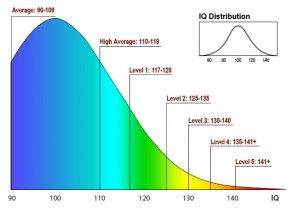Is my child gifted? It’s a common question most don’t want to admit to asking because all kids are gifted. Right?
No, they’re not.
Many parents begin to think their kid may not be like others when comparing milestones with kids of a similar age.
Maybe their kid began to read before they were potty trained. Maybe their kid prefers the company of older kids or adults over age mates.
Maybe their kid is fixated on the Kuiper Belt.
Whatever the clues, you wonder: could my child be gifted?
An IQ test is considered the definitive method of determining giftedness but those tests aren’t normally administered until the child is at least six years old. And, they’re usually expensive.
So, how do you know?
Ruf Estimates™ of Levels of Gifted
Using the Ruf Levels of Gifted can give insight on if your child is gifted, and if so, just how gifted they may be.
Ruf Levels of Gifted™
By Deborah L. Ruf, Ph.D.
Level One
- These children show interest in many things before they are even two years old – like colors, saying the numbers in order, and playing simple puzzles.
- Most of them are good talkers by age three, and by four, many print letters and numbers, recognize simple signs, their name, and know most of alphabet.
- By the time they are six years old, many read beginner books and type at the computer, and most read chapter books by age seven.
- It is not unusual to find six to eight Level One children in an average classroom, children who are nearly always a few steps ahead of what the teacher is teaching the whole class.
- These bright children love looking at books and being read to, even turning pages without ripping them, by 15 months. Some shout out the name of familiar stores as you drive past.
- They’ll sit for what seems like hours as you read advanced level books, especially fiction and fantasy, to them, but they require a bit less of your time by age six, because most of them read for pleasure and information on their own by then.
- Level Two children can find only one or two others in their classroom who are as advanced as they are, which starts to make it hard to find good friends.
Level Three
- They know what adults are telling or asking them by six months. You say a toy, pet, or another person, and they will look for it.
- By the time they are barely 12 months old, they can get family members to do what they want before they are actually talking.
- By two years, many like 35+ piece puzzles, memorize favorite books, and know the entire alphabet – in or out of order!
- By three years old, they talk constantly, and skip count, count backwards, and do simple adding and subtracting because they like to. They love to print letters and numbers, too.
- They ask you to teach them to read before five years, and many figure out how to multiply, divide, and do some fractions soon thereafter.
- Most of these children are a full two to five years beyond grade level by age six and find school too slow.
- There are one or two Level Three children in every 100 in the average school. They are rarely in the same elementary class and can feel very, very lonely.
Level Four
- Level Four babies love books, someone to read them, and pay attention very, very early.
- They have extensive, complex speaking while still in their toddler years, and their vocabularies are huge!
- Most of them read easy readers before kindergarten, and then read for information and pleasure soon thereafter, with comprehension for youth and adult level books while only in the early years of school.
- There are about one per 200 children in the average school. Without special arrangements, they can feel very different from their typical classmates.
Level Five
- Level Fives have talents in every possible area. Everything is sooner and more intense than others Levels.
- They have favorite TV shows when barely out of infancy, pick out letters and numbers by before they can talk, and enjoy shape sorters earlier than most children.
- They print letters, numbers, words, and their names in their early toddler years, and often use anything that is available to form these shapes and figures.
- They show ability with 35+ piece puzzles, often before they actually speak and interest in complex mazes while still only toddlers.
- Musical, dramatic, and artistic aptitudes usually start showing by 18 months.
- Most speak with adult-level complexity shortly after they speak at all!
- They understand math concepts and basic math functions well before they start formal schooling.
- They can play card and board games ages 12 and up when they are still in preschool.
- They have high interest in pure facts, almanacs, and dictionaries by age 3½.
- They read six or more years beyond grade level with comprehension by six years and usually hit 12th grade level by age 7 or 8.
Any of those bullet points sound familiar? I’m betting they do!
Learn more about signs your child may be gifted: 5 Levels of Gifted: School Issues and Educational Options

Read my story about how I figured out I might have a gifted child on my hands.
How about you? What clues did you have that your child might be gifted?
This post may contain affiliate links. Please see my disclosure policy for more information. Read my full disclosure statement.










Thank you for sharing this list! Very helpful!! I will share it with other parents, too. My son is level 5 but did not read at grade until first grade then skyrocketed to 12th-grade comprehension by second grade. He also has significant ADHD which I think is why we did not understand how bright he was initially. We were mostly worried about his aggression and getting in trouble at school. When we treated his ADHD his intellectual capacities became really apparent to teachers. It think, too, when you are an intense, gifted adult and it is normal in your family for people to obsess on topics and read a lot, you may not realize that not every family is that way…My daughter is probably level 3, but has struggled to learn to read. This list is solid, but for twice-exceptional kids, gifted kids with disabilities, levels of giftedness may be more difficult to discern. I’m glad the list mentions how important it is for gifted kids to find like-minded peers. It can be excruciatingly lonely out on the edge of the bell curve…